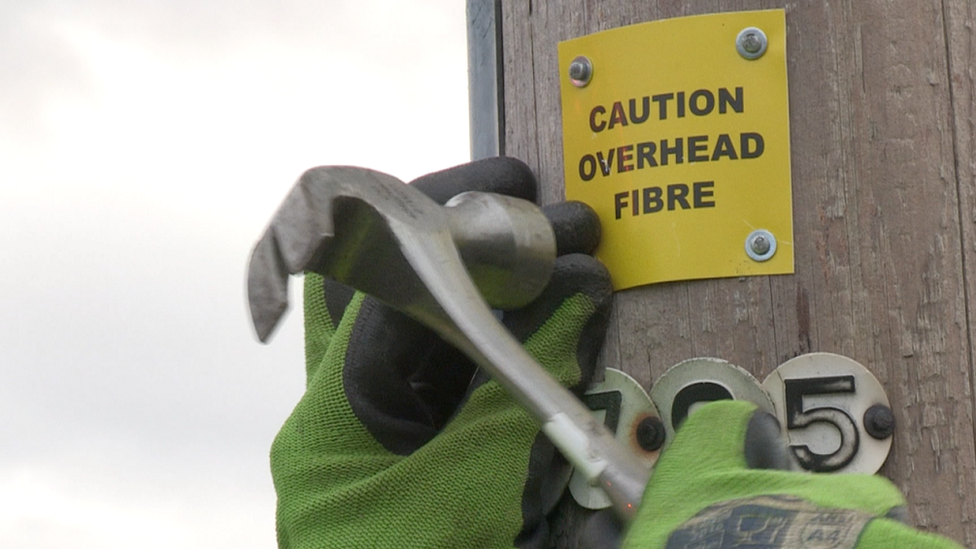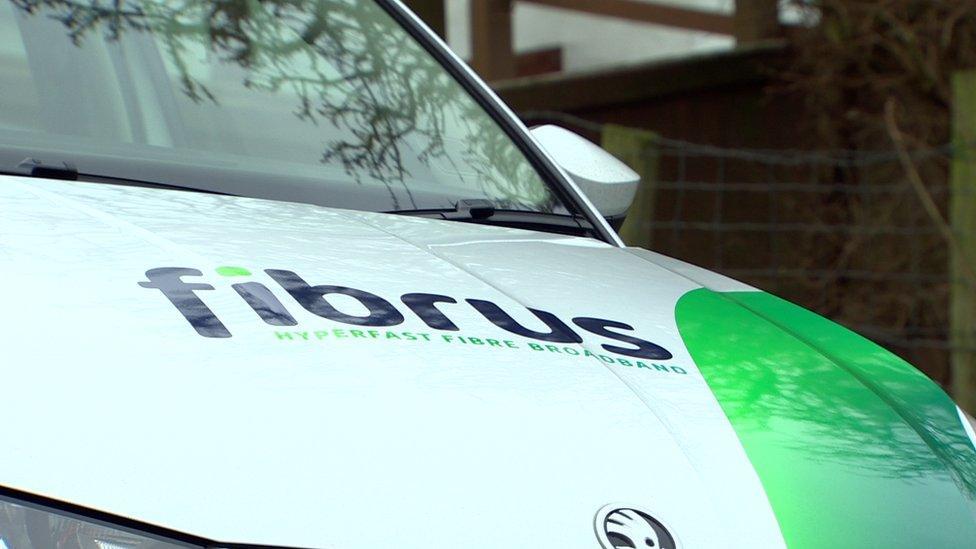Broadband: Are NI's internet issues on the mend?
- Published

For a software developer, working from home in rural Northern Ireland could be almost impossible due to a lack of broadband in the countryside.
Particularly when you live in Killinchy, County Down, home of the worst connected road for broadband in Northern Ireland.
But for George Kartvelishvili, Project Stratum - Stormont's £165m investment in improving rural broadband - has changed everything.
"The countryside is no longer just exclusively for retired people or people who don't need the internet," said George, who previously lived in London.
"Now technology professionals can live out in the fresh air, taking pressures off cities."
By the end of last year Fibrus, the firm contracted to carry out Project Stratum, had delivered broadband to more than 22,000 premises in 13 towns.
About 85,000 homes and businesses in total will be connected to full fibre broadband by 2025, when the scheme is due to be completed.
What does it mean?
Ofcom's 2021 NI report shows that superfast broadband is available to 91% of homes in Northern Ireland - 2% higher than 2020.
With speeds of up to 30Mbps, a 1GB file (roughly the size of a two hour film) can be downloaded in under five minutes with superfast broadband.
There has also been an increase in Northern Ireland homes that have access to full-fibre broadband connections - 116,000 more than in 2020, external.
Full-fibre broadband, which links cables directly to buildings, can boost internet speeds up to 1Gbps (equivalent to 1000Mbps).

Work is currently taking place to expand Project Stratum in seven more towns, including Keady, Castlerock and Crossmaglen
Project Stratum has been largely funded by £150m from the DUP and Conservative Party confidence and supply agreement.
The project has faced some criticism with the NI Audit Office questioning whether all of the £165m subsidy to improve rural broadband was necessary.
Shortly after Fibrus won the contract, BT announced its own plans which included 16,000 premises which were within Project Stratum areas.
In April 2021, BT made a further announcement that it intended to invest £100m to expand the availability of 1Gbps internet in Northern Ireland.
Auditor General Kieran Donnelly said the fact BT plans to invest in the Project Stratum areas raised questions.
In December, BT told the BBC that it was normal that plans can change because of operational issues and the updated premises data it provided in September 2020 reflected changes to its commercial build and future plans.
'Night and day difference'
Work is currently taking place to expand Project Stratum in seven more towns, including Keady, Castlerock and Crossmaglen.
In Killinchy, George says the broadband access at his home has been transformational.
When George moved there in 2019, he and his wife both worked from home, but with a "non-existent" internet connection they were working off 3G or 4G mobile connection.

By the end of 2021, Fibrus had delivered access to Full Fibre Broadband to 13 rural towns
"Connecting to work was a daily struggle where it would disconnect every three minutes," he said.
"I would usually tell everyone to get off the internet if I had an important meeting."
He said the difference in his internet speed before and after Project Stratum is "night and day".
He adds: "It's made an enormous amount of difference to my life."
"They lost two years of work"
Joanne McClean, who lives between Ballynahinch and Castlewellan in County Down, has been fighting for a better broadband connection for years.
"When my kids were in primary school they asked us if we could move to the town so we could get a broadband connection," she said.
"We were still paying our monthly bills for something we could not receive.
"It felt like banging your head on a brick wall - no one would listen to you.
"There was always an excuse. The mountains are in the way or you are in a dip in the road."

Schools, colleges and universities have alternated between face-to-face classes and online learning throughout the pandemic
During lockdown Joanne's children, Dylan and Iona, were left behind in classes at Downpatrick's South Eastern Regional College (SERC) because they did not have access to the internet for online learning.
"They lost two years of work," said Joanne.
"Dylan was studying ICT but he dropped out because he was falling so far behind."
When Project Stratum reached their area Dylan reapplied to his ICT course again.
"It gave him the boost to go back and try again," said Joanne.
"We are thankful that we have it now, but it is still not strong enough for some of the things Dylan wants to do - like gaming."
Broadband awareness
Dominic Kearns, chief executive at Fibrus, said Project Stratum is "life-changing" work.
He said it meant people living in rural towns and villages were just as connected as people and businesses in some of the UK's largest cities.
Ernest Doku, a broadband expert at Uswitch.com, said the rollout of this infrastructure is only half the problem.
"It is also a situation of broadband awareness," he said.
"That follow-on work in letting consumers know that this is available is crucial."

Broadband expert, Ernest Doku said providers like Fibrus need to educate consumers on why and how they can switch Broadband providers
An analysis of consumer speed tests collected by Uswitch.com in November 2021, external showed that while some areas of Northern Ireland were displaying fast internet speeds, a high number of places were off-pace.
The Ringhaddy Road in Killinchy, County Down, recorded the slowest average download speed in Northern Ireland, while the Old Ballynahinch Road in Lisburn had the fastest.
The road in Lisburn also featured in the top 10 fastest streets in the UK.
Mr Doku said it was discouraging to see the same discrepancies between different areas of Northern Ireland every year.
"It's frustrating for us to do these analyses when there are consumers who don't have to suffer with these slow broadband speeds," he said.
"In a lot of cases, a lot of consumers did have access to faster broadband connections.
"It is the role of providers like Fibrus to not only roll out the infrastructure, but also to educate consumers on the benefits of switching."
Related topics
- Published17 January 2022

- Published14 December 2021

- Published3 June 2020
